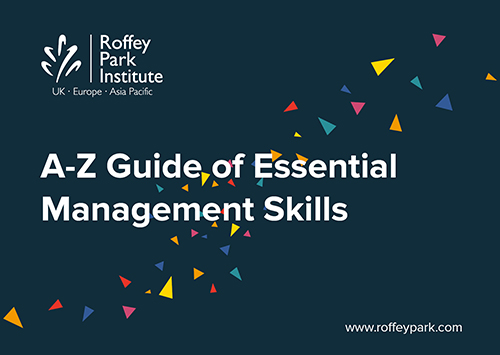
Whether you are new to management or have several years’ experience under your belt, being a successful people manager can be exciting and challenging – and one of the most important roles in any organisation.
So, it’s important to manage well. You could have the most fantastic workplace, on paper – but there’s truth in the saying that people tend to leave managers and not the organisation.
What is management?
Management is decision-making processes used to manage resources in the most efficient way to achieve organisational objectives.

Management involves planning, prioritising and checking that the right work is being achieved. Effective management skills are about recognising the power of your people and developing their potential to help fulfil an organisation’s purpose and mission.
Whether you are new to supervision or line management or a seasoned middle manager, this short guide could help your essential management skills. Although if you really are new to the job, it’s a good idea to make sure you get some new managers training.
Authentic
Authentic managers act in a genuine and sincere way that is true to who they are as individuals. Why is this important? Managers who are consistent in their beliefs and actions most likely to inspire trust, loyalty and high performances from the team they manage.
Balcony View

Success as a manager mean being able to observe and understand several different datasets so you can tune into what is important, what they mean for you and your team and react accordingly. Regularly stepping back from the action so you can observe from the “balcony” is one way to make sense of all this information.
This not as easy as it sounds. Emails, telephone calls, meetings all demand immediate attention but taking time out to listen and observe will help you make the right choices.
Coaching
Coaching skills are crucial for managers. Use them to help develop your team: challenge them to think critically about issues and broaden their perspective. Coaching can also improve collaborative decision making by asking questions that help people open up, enabling you can tap into a broader perspective of ideas and expertise
Difficult Conversations

Having difficult conversations is never easy but managers must hold their teams accountable. Most of us don’t want to be cast as the ‘bad guy’ so noticing and addressing early signs of poor performance is often avoided. The most effective line managers will take control and talk about problems as they arrive.
Emotional Intelligence
Emotional Intelligence is being able to identify and manage your own emotions as well as the emotions of others. Effectively managing a team means being able to recognise people’s strengths and understand how to deal with a range of (sometimes conflicting) personality types.
Followership
When do we lead, manage or follow? Sometimes the line between these is blurred as a result of the agility required in today’s complex workplace. Followership is often seen as a negative thing, but maybe it’s time to recognise that success in organisations is sometimes about great followership as well as great leadership and management.

How do you balance being a manager and a follower? It’s not about micro-managing, but it is about empowerment and supporting your employee to take ownership and responsibility. They may make different decisions or choices, but they’ll get the job done and you’ll both have learned something in the process.
Growth-orientated
Your role as a manager is to help your team progress, as individuals and as a group. Get to know your team, and you can make the best use of their individual talents. Finding out what works and doesn’t work helps you create opportunities and remove obstacles so your team can perform at its best.
Have Perspective
It’s easy to stay focused on managing the task and ignore concerns raised by your team, particularly when juggling deadlines and priorities. But if you colleague says something you find frustrating – why? If you were in their shoes how would you think or feel? What position are they coming from? Perspective-taking allows you to understand the root cause of any problems and enable you to work with employees and colleagues to solve them.
Identify your management style

Take some time to consider your management style and understand how to flex it in different situations. Effective managers can adapt their style to the situation, using cues such as the type of task, the nature of the group, and other factors that contribute to getting the job done.
Judgement
An essential management skill is the ability to make good judgements allowing them to move forward. Good judgments are based on observing what’s around you, listening to what others say and learning from that information.
Judgement is often described as “gut feeling” because it comes from sensory signals which your unconscious mind can process faster than your conscious mind. But with too much information, too many opinions and too many points of view, the way forward may not be clear.
The key is that managers need to rely on their own judgement. Get balance right and the results will be the best decisions you’ve ever made
Know how to give feedback
Knowing how to provide constructive feedback is an important skill. Effective feedback is given with positive intent, to build confidence, recognise a contribution or identify what might be impeding progress. The more senior managers become, the more they are protected from feedback. Try to ensure you are always asking for feedback and that you are open-minded when you get it.
Learn, learn, learn

Successful managers aren’t only good at what they do. They inspire their employees to reach their full potential, and they make those around them good at what they do too. But managers can’t become the best versions of themselves unless they work on developing their management qualities.
That means starting with being honest about where you need help. Learning can take many forms, including from reading articles, online learning and management training courses as well as learning from others.
Mindset
Moving from being a “doer” to a “generalist” requires a major shift in your mindset. It’s no longer just about you: as a manager you need to put the needs and development of others before your own. Watching others grow, learn and succeed because of your management will give you a greater buzz than you ever felt as an individual.
Network with other managers
Building a network with other managers is one way to learn about your role in the organisation. Ask them questions about their role, why certain decisions are made, how their department functions and interact with your own team and so on. Don’t stop with managers in your own organisation: build connections with outside managers who can give you the external perspective needed to inform your decisions.
Organisation
As a manager you’ll juggle multiple priorities and responsibilities, so excellent organisational skills are vital. You’ll need to manage your own projects, supervise the work of others, attend meetings and contribute to organisational initiatives. Finding the right balance is down to prioritisation and staying on top of all your goals, whether short, medium or long-term.
Politics
What does office politics mean to you? For many, it’s competing agendas which leave managers feeling bruised, conflicted and stressed. But – we need different perspectives in order to achieve organisational goals and that’s all politics really is.
Effective management skills are about not getting so caught up in the task or sense of “being right” and instead looking at the wider context of what the organisation is trying to achieve. It takes a lot of confidence to change your mind in the face of conflict but if you can see that it is for the greater good.
Questions

Get used to asking questions. How is your team are feeling about change? What contributed to a recent success? What can be learnt? How is the world is changing? What might be needed in the future? And so on.
Questions are a great way of challenging people to take a fresh look at an issue and help them think about the outcomes they want.
Resilience
Resilience is an important people management skill. Visibility exposes you to criticism, so the ability to manage that, pick yourself up after disappointments, and to motivate yourself is key. Our own research on this shows that our ability to be resilient is likely to vary over time and circumstance and be amenable to change through our own efforts. Effective people managers are self-reliant. They will recover from knocks because they know that whilst they cannot change other people, or external circumstances, they can always change their own response to a situation.
Skill of delegation
Many people who become managers simply try to add management to their job instead of changing their approach. And then feel quickly overwhelmed.
Delegation – managing others so they deliver results – is a key skill to learn fast. Delegating is not something you do TO people; it is something you do FOR people.
Trust
Trust matters because organisations with low levels of trust between employees require unnecessary monitoring, duplication and bureaucracy. The result is often a lack of engagement and high staff turnover. In our own research we found that where high trust exists, employees go the extra mile.
Trusting relationships between managers and their team encourages people to focus on their work, to take risks and try different ways of doing things. Building trust is one way of winning hearts and minds of those you work alongside.
Unconscious bias

We all have unconscious biases. It affects our decisions in a subtle way, but with significant consequences. Managers can address this by increasing their awareness of their unconscious biases, and being prepared to challenge them, and making the most of the abilities of their team members.
Visibility
Being visible to your team is important: the more visible you are the more connected people will feel to you. Spend time in the day informally chatting to your team instead of through meetings or sitting in your office. That will go a long way to build trusting relationships.
Workplace Conflict
All managers will be faced with managing conflict at some time. Depending on the way it is managed, conflict can be positive, contributing to increased team and individual confidence. As a manager, you play a crucial role in creating a safe and productive working environment for your whole team.
The challenge of conflict lies in how you choose to deal with it. Concealed, avoided or ignored, conflict will fester and grow. Where there is a desire, conflict can normally be resolved.
eXpectations
It’s important to set and clarify expectations to establish team and individual performance goals and how you and your team will interact. Clear expectations will lead to higher performance. In addition, you will need to clarify expectations of your own manager so you can understand their priorities and the changes necessary for you to be successful.
You – it’s all about you

Effective managers are people who know themselves, from the inside out, good, bad and ugly. They can speak about their strengths and weaknesses without any embarrassment or defensiveness. Managers rarely feel safe about admitting vulnerability because they fear it will reflect badly on them. But being more self-aware, more open and transparent will mean you are more human to the people you manage, and they will connect with you as a result.
It’s important to think about you, and that means not being afraid to say that you need training for new managers at the start of this part of your career – and more development of other skills as you become more practised.
Zen
You’ll be a better manager when you take care of yourself physically, mentally and spiritually. Take time to eat and sleep, to exercise, to learn and to spend time doing the things that are important to you. Paying attention to this means both you and your team will benefit.
You can download this A to Z Guide has a handy pdf to share with your managers.
Management training for new managers (and others): how we can help develop your management skills
Our Essential Management Skills course gives a great grounding in tools and techniques for newly-appointed and more experienced line managers who want to improve their knowledge of management and understand how to manage people successfully, or reflect upon and further develop those skills. It’s crucial new managers training – and pretty important for anyone who wants to get better at what they do.
At Roffey Park we believe each of us can develop effective management skills, but we will do this in our own way. This management training programme explores a range of methods, models and approaches that enhances your people management skills.
If that’s not realistic for now, get reading. There are some fantastic books out there to get you started and help you understand yourself better. We believe this knowledge underpins the best managers and leaders.





